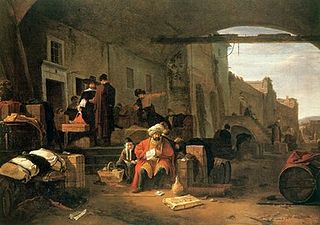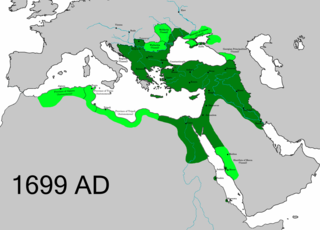
A merchant is a person who trades in commodities produced by other people, especially one who trades with foreign countries. Historically, a merchant is anyone who is involved in business or trade. Merchants have operated for as long as industry, commerce, and trade have existed. In 16th-century Europe, two different terms for merchants emerged: meerseniers referred to local traders and koopman referred to merchants who operated on a global stage, importing and exporting goods over vast distances and offering added-value services such as credit and finance.

Robert Choate Darnton is an American cultural historian and academic librarian who specializes in 18th-century France.

The history of the Ottoman Empire in the 18th century has classically been described as one of stagnation and reform. In analogy with 18th-century France, it is also known as the Ancien Régime or Old Regime, contrasting with the "New Regime" of the Nizam-i Cedid and Tanzimat in the 19th century.
Jonathan Charles Douglas Clark is a British historian of both British and American history. He received his undergraduate degree at Downing College, Cambridge. Having previously held posts at Peterhouse, Cambridge and All Souls College, Oxford into 1996, he has since held the Joyce C. and Elizabeth Ann Hall Distinguished Professorship of British History at the University of Kansas.
Jeremy Black is a British historian, writer, and former professor of history at the University of Exeter. He is a senior fellow at the Center for the Study of America and the West at the Foreign Policy Research Institute in Philadelphia, US.
John Mitchell was a colonial American physician and botanist. He created the most comprehensive and perhaps largest 18th-century map of eastern North America, known today as the Mitchell Map. First published in 1755, in conjunction with the imminent Seven Years' War, the map was subsequently used during the Treaty of Paris (1783) to define the boundaries of the newly independent United States and has been resolving border disputes since.
The American Society for Eighteenth-Century Studies (ASECS) is an academic society for humanities research related to the "long" eighteenth century, from the later seventeenth through the early nineteenth centuries. ASECS was established in 1969, and has been an affiliate of the American Historical Association (AHA) since 2000. ASECS is an interdisciplinary society in the sense that its members come from a wide range of humanities disciplines, including history, literature, philosophy, art history, and musicology. The society organizes an annual conference and sponsors two publications: the quarterly journal Eighteenth-Century Studies and the annual volume Studies in Eighteenth-Century Culture.
The British Society for Eighteenth-Century Studies (BSECS) is an interdisciplinary scholarly society founded in 1971 and based in the United Kingdom which promotes the study of all aspects of eighteenth-century history and culture. Its members are both academics and members of the public from all over the world with a diverse range of interests in the history, literature, art history, architecture, music, science, and wider culture of the long eighteenth century between approximately 1660 and 1820. BSECS is an affiliate of the International Society for Eighteenth-Century Studies (ISECS).
Police impersonation is the act of falsely portraying oneself as a member of the police for the purpose of deception.
Peter James Marshall is a British historian known for his work on the British Empire, particularly the activities of British East India Company servants in 18th-century Bengal, and also the history of British involvement in North America during the same period. He is not to be confused with his contemporary, the other P. J. Marshall, who chronicled the history of public transport in the British Isles.

The Midlands Enlightenment, also known as the West Midlands Enlightenment or the Birmingham Enlightenment, was a scientific, economic, political, cultural and legal manifestation of the Age of Enlightenment that developed in Birmingham and the wider English Midlands during the second half of the eighteenth century.

Louis Reichenthal Gottschalk was an American historian, an expert on Lafayette and the French Revolution. He taught for many years at the University of Chicago, where he was the Gustavus F. and Ann M. Swift Distinguished Service Professor of History.
The Handel Reference Database (HRD) is the largest documentary collection on George Frideric Handel (1685–1759) and his times. It was launched in January 2008 on the server of the Center for Computer Assisted Research in the Humanities (CCARH) at Stanford University. Originally assembled by Ilias Chrissochoidis to support his PhD dissertation "Early Reception of Handel's Oratorios, 1732–1784: Narrative-Studies-Documents", it now includes about 4,000 items and 800,000 words. HRD is organized chronologically, covering the period from 1685 to 1784 and focusing on Handel's British career and reception. It includes transcriptions of printed and manuscript sources, some of which remain unpublished and external links to early secondary literature on the composer. The project received financial support from Houghton Library, Harvard University (2010–11) and UCLA's William Andrews Clark Memorial Library (2011–12).
Srinivas Aravamudan was an Indian-born American academic. He was a professor of English, Literature, and Romance Studies at Duke University, where he also served as dean of the humanities. He was widely recognized for his work on eighteenth-century British and French literature and postcolonial literature and theory. His publications included books and articles on novels, slavery, abolition, secularism, cosmopolitanism, globalization, climate change, and the anthropocene.
Dr. María Isabel Fierro Bello is a researcher on Middle Eastern studies at the Spanish National Research Council's humanities branch in Madrid, Spain. Fierro has served as a visiting scholar at the University of Chicago Divinity School in Chicago, the School for Advanced Studies in the Social Sciences in Paris, The Institute for Advanced Studies at The Hebrew University of Jerusalem and the Institute for Advanced Study in Princeton. In 2020 she was elected to the American Philosophical Society.
Eighteenth-Century Ireland or Iris an dá chultúr, is an annual, peer-reviewed academic journal of eighteenth century Ireland published on behalf of the Eighteenth-Century Ireland Society. The journal was established in 1986. Articles are in English, Irish, or French.
Mary Lindemann is an American historian and professor emerita of history at the University of Miami. She was president of the American Historical Association during the term 2020 and president of the German Studies Association during the term 2017–2018. She is a leading expert on the history of early modern Europe, the history of Germany and the history of medicine, especially early modern German, Dutch, and Flemish history. She is co-editor-in-chief of the journal Early Modern Women: An Interdisciplinary Journal.
Margaret Jacob is an American historian of science and Distinguished Professor of Research at UCLA. She specializes in the history of science, knowledge, the Enlightenment and Freemasonry.

Mary Elizabeth Caroline Bartlet was a Canadian-born musicologist known for her scholarship on French music, and particularly opera, in the 18th and 19th centuries. She also produced pioneering critical editions of the scores for Rossini's Guillaume Tell and Rameau's Platée. At the time of her death she was a professor of music at Duke University and a director of the American Musicological Society.






